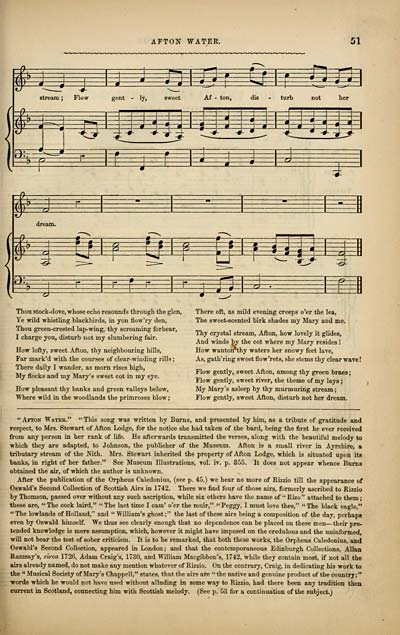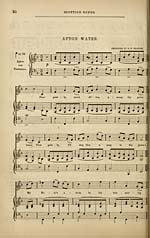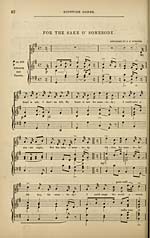Inglis Collection of printed music > Printed music > Songs of Scotland adapted to their appropriate melodies > Volume 2
(63) Page 51
Download files
Complete book:
Individual page:
Thumbnail gallery: Grid view | List view

AFTON WATER.
51
Fm
^E^
E
3
3e£
i
stream ; Flow gent - Jy, sweet Af - ton,
dis - turb not her
ipiP»flg§i^il
m
$=&--
w
iH
dream.
m
P^FP
M
rr
33
m
F — F — F-
Thou stock-dove, whose echo resounds through the glen,
Ye wild whistling blackbirds, in yon tiow'ry den,
Thou green-crested lap-wing, thy screaming forbear,
I charge you, disturb not my slumbering fair.
How lofty, sweet Afton, thy neighbouring hills,
Far mark'd with the courses of clear-winding rills;
There daily I wander, as morn rises high,
My flocks and my Mary's sweet cot in my eye.
How pleasant thy banks and green valleys below,
Where wild in the woodlands the primroses blow;
There oft, as mild evening creeps o'er the lea,
The sweet-scented birk shades my Mary and me.
Thy crystal stream, Afton, how lovely it glides,
And winds by the cot where my Mary resides !
How wanton thy waters her snowy feet lave,
As, gath'ring sweet flow'rets, she stems thy clear wave !
Flow gently, sweet Afton, among thy green braes;
Flow gently, sweet river, the theme of my lays ;
My Mary's asleep by thy murmuring stream ;
Flow gently, sweet Afton, disturb not her dream.
" Afton Water." " This song was written by Burns, and presented by him, as a tribute of gratitude and
respect, to Mrs. Stewart of Afton Lodge, for the notice she had taken of the bard, being the first he ever received
from any person in her rank of life. He afterwards transmitted the verses, along with the beautiful melody to
which they are adapted, to Johnson, the publisher of the Museum. Afton is a small river in Ayrshire, a
tributary stream of the Nith. Mrs. Stewart inherited the property of Afton Lodge, which is situated upon its
banks, in right of her father." See Museum Illustrations, vol. iv. p. 355. It does not appear whence Burns
obtained the air, of which the author is unknown.
After the publication of the Orpheus Caledonius, (see p. 45.) we hear no more of Rizzio till the appearance of
Oswald's Second Collection of Scottish Airs in 1742. There we find four of those airs, formerly ascribed to Kizzio
by Thomson, passed over without any such ascription, while six others have the name of " Rizo " attached to them ;
these are, "The cock laird," "The last time I cam' o'er the muir," "Peggy, I must love thee," "The black eagle,"
"The lowlands of Holland," and "William's ghost;" the last of these airs being a composition of the day, perhaps
even by Oswald himself. We thus see clearly enough that no dependence can be placed on these men their pre-
tended knowledge is mere assumption, which, however it might have imposed on the credulous and the uninformed,
will not bear the test of sober criticism. It is to be remarked, that both these works, the Orpheus Caledonius, and
Oswald's Second Collection, appeared in London; and that the contemporaneous Edinburgh Collections, Allan
Ramsay's, circa 1726, Adam Craig's, 1730, and William Macgibbon's, 1742, while they contain most, if not all the
airs already named, do not make any mention whatever of Rizzio. On the contrary, Craig, in dedicating bis work to
the "Musical Society of Mary's Chappell," states, that the airs are "the native and genuine product of the country;"
words which he would not have used without alluding in some way to Rizzio, had there been any tradition then
current in Scotland, connecting him with Scottish melody. (See p. 53 for a continuation of the subject. J
51
Fm
^E^
E
3
3e£
i
stream ; Flow gent - Jy, sweet Af - ton,
dis - turb not her
ipiP»flg§i^il
m
$=&--
w
iH
dream.
m
P^FP
M
rr
33
m
F — F — F-
Thou stock-dove, whose echo resounds through the glen,
Ye wild whistling blackbirds, in yon tiow'ry den,
Thou green-crested lap-wing, thy screaming forbear,
I charge you, disturb not my slumbering fair.
How lofty, sweet Afton, thy neighbouring hills,
Far mark'd with the courses of clear-winding rills;
There daily I wander, as morn rises high,
My flocks and my Mary's sweet cot in my eye.
How pleasant thy banks and green valleys below,
Where wild in the woodlands the primroses blow;
There oft, as mild evening creeps o'er the lea,
The sweet-scented birk shades my Mary and me.
Thy crystal stream, Afton, how lovely it glides,
And winds by the cot where my Mary resides !
How wanton thy waters her snowy feet lave,
As, gath'ring sweet flow'rets, she stems thy clear wave !
Flow gently, sweet Afton, among thy green braes;
Flow gently, sweet river, the theme of my lays ;
My Mary's asleep by thy murmuring stream ;
Flow gently, sweet Afton, disturb not her dream.
" Afton Water." " This song was written by Burns, and presented by him, as a tribute of gratitude and
respect, to Mrs. Stewart of Afton Lodge, for the notice she had taken of the bard, being the first he ever received
from any person in her rank of life. He afterwards transmitted the verses, along with the beautiful melody to
which they are adapted, to Johnson, the publisher of the Museum. Afton is a small river in Ayrshire, a
tributary stream of the Nith. Mrs. Stewart inherited the property of Afton Lodge, which is situated upon its
banks, in right of her father." See Museum Illustrations, vol. iv. p. 355. It does not appear whence Burns
obtained the air, of which the author is unknown.
After the publication of the Orpheus Caledonius, (see p. 45.) we hear no more of Rizzio till the appearance of
Oswald's Second Collection of Scottish Airs in 1742. There we find four of those airs, formerly ascribed to Kizzio
by Thomson, passed over without any such ascription, while six others have the name of " Rizo " attached to them ;
these are, "The cock laird," "The last time I cam' o'er the muir," "Peggy, I must love thee," "The black eagle,"
"The lowlands of Holland," and "William's ghost;" the last of these airs being a composition of the day, perhaps
even by Oswald himself. We thus see clearly enough that no dependence can be placed on these men their pre-
tended knowledge is mere assumption, which, however it might have imposed on the credulous and the uninformed,
will not bear the test of sober criticism. It is to be remarked, that both these works, the Orpheus Caledonius, and
Oswald's Second Collection, appeared in London; and that the contemporaneous Edinburgh Collections, Allan
Ramsay's, circa 1726, Adam Craig's, 1730, and William Macgibbon's, 1742, while they contain most, if not all the
airs already named, do not make any mention whatever of Rizzio. On the contrary, Craig, in dedicating bis work to
the "Musical Society of Mary's Chappell," states, that the airs are "the native and genuine product of the country;"
words which he would not have used without alluding in some way to Rizzio, had there been any tradition then
current in Scotland, connecting him with Scottish melody. (See p. 53 for a continuation of the subject. J
Set display mode to: Large image | Transcription
Images and transcriptions on this page, including medium image downloads, may be used under the Creative Commons Attribution 4.0 International Licence unless otherwise stated. ![]()
| Special collections of printed music > Inglis Collection of printed music > Printed music > Songs of Scotland adapted to their appropriate melodies > Volume 2 > (63) Page 51 |
|---|
| Permanent URL | https://digital.nls.uk/94710036 |
|---|
| Shelfmark | Ing.128 |
|---|---|
| Additional NLS resources: | |
| Attribution and copyright: |
|
| Description | Scottish and English songs, military music and keyboard music of the 18th and 19th centuries. These items are from the collection of Alexander Wood Inglis of Glencorse (1854 to 1929). Also includes a few manuscripts, some treatises and other books on the subject. |
|---|
| Description | The Glen Collection and the Inglis Collection represent mainly 18th and 19th century Scottish music, including Scottish songs. The collections of Berlioz and Verdi collected by bibliographer Cecil Hopkinson contain contemporary and later editions of the works of the two composers Berlioz and Verdi. |
|---|

